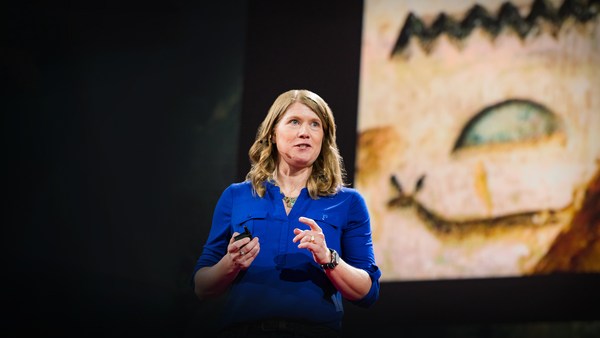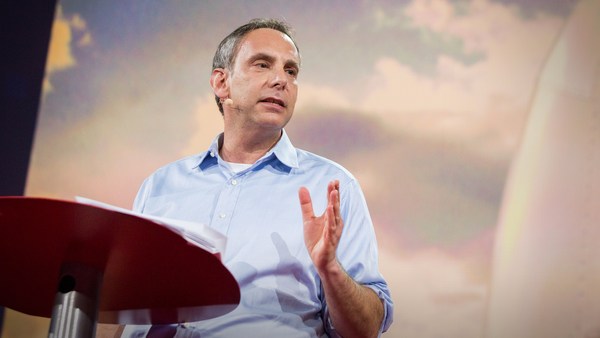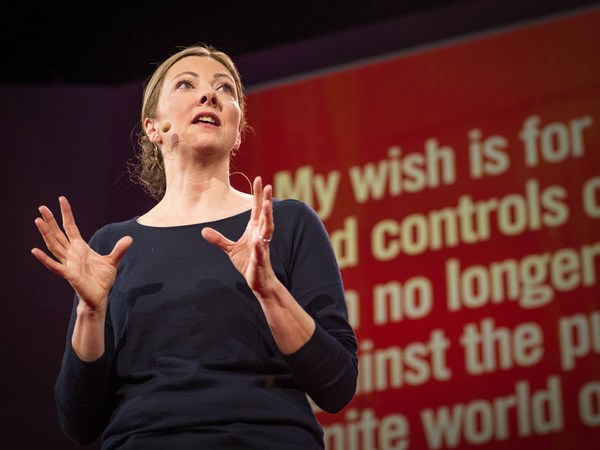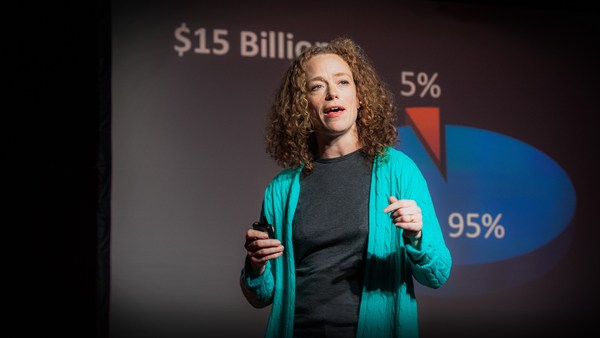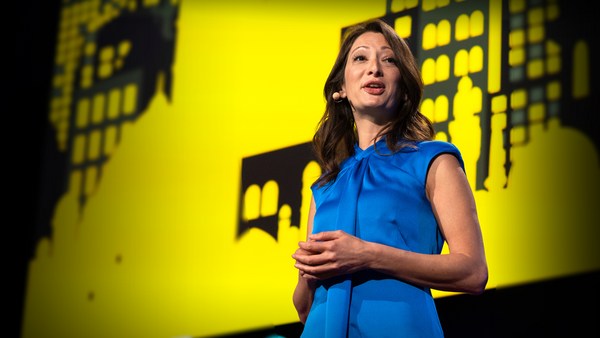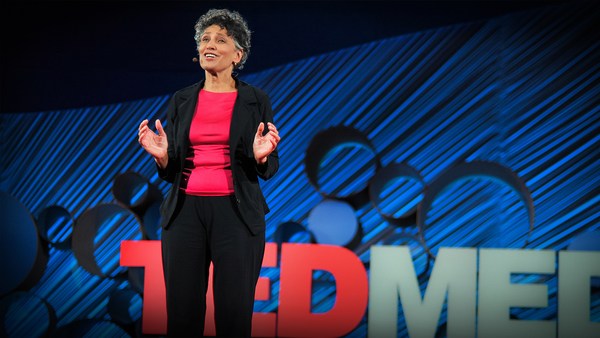I want to share with you something my father taught me: no condition is permanent. It's a lesson he shared with me again and again, and I learned it to be true the hard way.
Here I am in my fourth-grade class. This is my yearbook picture taken in my class in school in Monrovia, Liberia. My parents migrated from India to West Africa in the 1970s, and I had the privilege of growing up there. I was nine years old, I loved kicking around a soccer ball, and I was a total math and science geek. I was living the kind of life that, really, any child would dream of. But no condition is permanent.
On Christmas Eve in 1989, civil war erupted in Liberia. The war started in the rural countryside, and within months, rebel armies had marched towards our hometown. My school shut down, and when the rebel armies captured the only international airport, people started panicking and fleeing. My mom came knocking one morning and said, "Raj, pack your things -- we have to go." We were rushed to the center of town, and there on a tarmac, we were split into two lines. I stood with my family in one line, and we were stuffed into the cargo hatch of a rescue plane. And there on a bench, I was sitting with my heart racing. As I looked out the open hatch, I saw hundreds of Liberians in another line, children strapped to their backs. When they tried to jump in with us, I watched soldiers restrain them. They were not allowed to flee.
We were the lucky ones. We lost what we had, but we resettled in America, and as immigrants, we benefitted from the community of supporters that rallied around us. They took my family into their home, they mentored me. And they helped my dad start a clothing shop. I'd visit my father on weekends as a teenager to help him sell sneakers and jeans. And every time business would get bad, he'd remind me of that mantra: no condition is permanent. That mantra and my parents' persistence and that community of supporters made it possible for me to go through college and eventually to medical school. I'd once had my hopes crushed in a war, but because of them, I had a chance to pursue my dream to become a doctor. My condition had changed.
It had been 15 years since I escaped that airfield, but the memory of those two lines had not escaped my mind. I was a medical student in my mid-20s, and I wanted to go back to see if I could serve the people we'd left behind. But when I got back, what I found was utter destruction. The war had left us with just 51 doctors to serve a country of four million people. It would be like the city of San Francisco having just 10 doctors. So if you got sick in the city where those few doctors remain, you might stand a chance. But if you got sick in the remote, rural rainforest communities, where you could be days from the nearest clinic -- I was seeing my patients die from conditions no one should die from, all because they were getting to me too late. Imagine you have a two-year-old who wakes up one morning with a fever, and you realize she could have malaria, and you know the only way to get her the medicine she needs would be to take her to the riverbed, get in a canoe, paddle to the other side and then walk for up to two days through the forest just to reach the nearest clinic.
One billion people live in the world's most remote communities, and despite the advances we've made in modern medicine and technology, our innovations are not reaching the last mile. These communities have been left behind, because they've been thought too hard to reach and too difficult to serve. Illness is universal; access to care is not. And realizing this lit a fire in my soul. No one should die because they live too far from a doctor or clinic. No condition should be permanent. And help in this case didn't come from the outside, it actually came from within. It came from the communities themselves.
Meet Musu. Way out in rural Liberia, where most girls have not had a chance to finish primary school, Musu had been persistent. At the age of 18, she completed high school, and she came back to her community. She saw that none of the children were getting treatment for the diseases they needed treatment for -- deadly diseases, like malaria and pneumonia. So she signed up to be a volunteer. There are millions of volunteers like Musu in rural parts around our world, and we got to thinking -- community members like Musu could actually help us solve a puzzle.
Our health care system is structured in such a way that the work of diagnosing disease and prescribing medicines is limited to a team of nurses and doctors like me. But nurses and doctors are concentrated in cities, so rural communities like Musu's have been left behind.
So we started asking some questions: What if we could reorganize the medical care system? What if we could have community members like Musu be a part or even be the center of our medical team? What if Musu could help us bring health care from clinics in cities to the doorsteps of her neighbors? Musu was 48 when I met her. And despite her amazing talent and grit, she hadn't had a paying job in 30 years. So what if technology could support her? What if we could invest in her with real training, equip her with real medicines, and have her have a real job?
Well, in 2007, I was trying to answer these questions, and my wife and I were getting married that year. We asked our relatives to forgo the wedding registry gifts and instead donate some money so we could have some start-up money to launch a nonprofit. I promise you, I'm a lot more romantic than that.
(Laughter)
We ended up raising $6,000, teamed up with some Liberians and Americans and launched a nonprofit called Last Mile Health. Our goal is to bring a health worker within reach of everyone, everywhere. We designed a three-step process -- train, equip and pay -- to invest more deeply in volunteers like Musu to become paraprofessionals, to become community health workers.
First we trained Musu to prevent, diagnose and treat the top 10 diseases afflicting families in her village. A nurse supervisor visited her every month to coach her. We equipped her with modern medical technology, like this $1 malaria rapid test, and put it in a backpack full of medicines like this to treat infections like pneumonia, and crucially, a smartphone, to help her track and report on epidemics. Last, we recognized the dignity in Musu's work. With the Liberian government, we created a contract, paid her and gave her the chance to have a real job. And she's amazing.
Musu has learned over 30 medical skills, from screening children for malnutrition, to assessing the cause of a child's cough with a smartphone, to supporting people with HIV and providing follow-up care to patients who've lost their limbs. Working as part of our team, working as paraprofessionals, community health workers can help ensure that a lot of what your family doctor would do reaches the places that most family doctors could never go.
One of my favorite things to do is to care for patients with community health workers. So last year I was visiting A.B., and like Musu, A.B. had had a chance to go to school. He was in middle school, in the eighth grade, when his parents died. He became an orphan and had to drop out. Last year, we hired and trained A.B. as a community health worker. And while he was making door to door house calls, he met this young boy named Prince, whose mother had had trouble breastfeeding him, and by the age of six months, Prince had started to waste away. A.B. had just been taught how to use this color-coded measuring tape that wraps around the upper arm of a child to diagnose malnutrition. A.B. noticed that Prince was in the red zone, which meant he had to be hospitalized.
So A.B. took Prince and his mother to the river, got in a canoe and paddled for four hours to get to the hospital. Later, after Prince was discharged, A.B. taught mom how to feed baby a food supplement. A few months ago, A.B. took me to visit Prince, and he's a chubby little guy.
(Laughter)
He's meeting his milestones, he's pulled himself up to a stand, and is even starting to say a few words. I'm so inspired by these community health workers. I often ask them why they do what they do, and when I asked A.B., he said, "Doc, since I dropped out of school, this is the first time I'm having a chance to hold a pen to write. My brain is getting fresh."
The stories of A.B. and Musu have taught me something fundamental about being human. Our will to serve others can actually help us transform our own conditions. I was so moved by how powerful the will to serve our neighbors can be a few years ago, when we faced a global catastrophe.
In December 2013, something happened in the rainforests across the border from us in Guinea. A toddler named Emile fell sick with vomiting, fever and diarrhea. He lived in an area where the roads were sparse and there had been massive shortages of health workers. Emile died, and a few weeks later his sister died, and a few weeks later his mother died. And this disease would spread from one community to another. And it wasn't until three months later that the world recognized this as Ebola. When every minute counted, we had already lost months, and by then the virus had spread like wildfire all across West Africa, and eventually to other parts of the world. Businesses shut down, airlines started canceling routes.
At the height of the crisis, when we were told that 1.4 million people could be infected, when we were told that most of them would die, when we had nearly lost all hope, I remember standing with a group of health workers in the rainforest where an outbreak had just happened. We were helping train and equip them to put on the masks, the gloves and the gowns that they needed to keep themselves safe from the virus while they were serving their patients. I remember the fear in their eyes. And I remember staying up at night, terrified if I'd made the right call to keep them in the field.
When Ebola threatened to bring humanity to its knees, Liberia's community health workers didn't surrender to fear. They did what they had always done: they answered the call to serve their neighbors. Community members across Liberia learned the symptoms of Ebola, teamed up with nurses and doctors to go door-to-door to find the sick and get them into care. They tracked thousands of people who had been exposed to the virus and helped break the chain of transmission. Some ten thousand community health workers risked their own lives to help hunt down this virus and stop it in its tracks.
(Applause)
Today, Ebola has come under control in West Africa, and we've learned a few things. We've learned that blind spots in rural health care can lead to hot spots of disease, and that places all of us at greater risk. We've learned that the most efficient emergency system is actually an everyday system, and that system has to reach all communities, including rural communities like Emile's. And most of all, we've learned from the courage of Liberia's community health workers that we as people are not defined by the conditions we face, no matter how hopeless they seem. We're defined by how we respond to them.
For the past 15 years, I've seen the power of this idea to transform everyday citizens into community health workers -- into everyday heroes. And I've seen it play out everywhere, from the forest communities of West Africa, to the rural fishing villages of Alaska. It's true, these community health workers aren't doing neurosurgery, but they're making it possible to bring health care within reach of everyone everywhere.
So now what? Well, we know that there are still millions of people dying from preventable causes in rural communities around the world. And we know that the great majority of these deaths are happening in these 75 blue-shaded countries. What we also know is that if we trained an army of community health workers to learn even just 30 lifesaving skills, we could save the lives of nearly 30 million people by 2030. Thirty services could save 30 million lives by 2030. That's not just a blueprint -- we're proving this can be done.
In Liberia, the Liberian government is training thousands of workers like A.B. and Musu after Ebola, to bring health care to every child and family in the country. And we've been honored to work with them, and are now teaming up with a number of organizations that are working across other countries to try to help them do the same thing. If we could help these countries scale, we could save millions of lives, and at the same time, we could create millions of jobs.
We simply can't do that, though, without technology. People are worried that technology is going to steal our jobs, but when it comes to community health workers, technology has actually been vital for creating jobs. Without technology -- without this smartphone, without this rapid test -- it would have been impossible for us to be able to employ A.B. and Musu. And I think it's time for technology to help us train, to help us train people faster and better than ever before.
As a doctor, I use technology to stay up-to-date and keep certified. I use smartphones, I use apps, I use online courses. But when A.B. wants to learn, he's got to jump back in that canoe and get to the training center. And when Musu shows up for training, her instructors are stuck using flip charts and markers. Why shouldn't they have the same access to learn as I do? If we truly want community health workers to master those lifesaving skills and even more, we've got to change this old-school model of education. Tech can truly be a game changer here. I've been in awe of the digital education revolution that the likes of Khan Academy and edX have been leading. And I've been thinking that it's time; it's time for a collision between the digital education revolution and the community health revolution.
And so, this brings me to my TED Prize wish. I wish -- I wish that you would help us recruit the largest army of community health workers the world has ever known by creating the Community Health Academy, a global platform to train, connect and empower.
(Applause)
Thank you.
(Applause)
Thank you.
Here's the idea: we'll create and curate the best in digital education resources. We will bring those to community health workers around the world, including A.B. and Musu. They'll get video lessons on giving kids vaccines and have online courses on spotting the next outbreak, so they're not stuck using flip charts. We'll help these countries accredit these workers, so that they're not stuck remaining an under-recognized, undervalued group, but become a renowned, empowered profession, just like nurses and doctors.
And we'll create a network of companies and entrepreneurs who've created innovations that can save lives and help them connect to workers like Musu, so she can help better serve her community. And we'll work tirelessly to persuade governments to make community health workers a cornerstone of their health care plans. We plan to test and prototype the academy in Liberia and a few other partner countries, and then we plan to take it global, including to rural North America. With the power of this platform, we believe countries can be more persuaded that a health care revolution really is possible.
My dream is that this academy will contribute to the training of hundreds of thousands of community members to help bring health care to their neighbors -- the hundreds of millions of them that live in the world's most remote communities, from the forest communities of West Africa, to the fishing villages of rural Alaska; from the hilltops of Appalachia, to the mountains of Afghanistan. If this vision is aligned with yours, head to communityhealthacademy.org, and join this revolution. Let us know if you or your organization or someone you know could help us as we try to build this academy over the next year.
Now, as I look out into this room, I realize that our journeys are not self-made; they're shaped by others. And there have been so many here that have been part of this cause. We're so honored to be part of this community, and a community that's willing to take on a cause as audacious as this one, so I wanted to offer, as I end, a reflection.
I think a lot more about what my father taught me. These days, I too have become a dad. I have two sons, and my wife and I just learned that she's pregnant with our third child.
(Applause)
Thank you.
(Applause)
I was recently caring for a woman in Liberia who, like my wife, was in her third pregnancy. But unlike my wife, had had no prenatal care with her first two babies. She lived in an isolated community in the forest that had gone for 100 years without any health care until ... until last year when a nurse trained her neighbors to become community health workers.
So here I was, seeing this patient who was in her second trimester, and I pulled out the ultrasound to check on the baby, and she started telling us stories about her first two kids, and I had the ultrasound probe on her belly, and she just stopped mid-sentence. She turned to me and she said, "Doc, what's that sound?" It was the first time she'd ever heard her baby's heartbeat. And her eyes lit up in the same way my wife's eyes and my own eyes lit up when we heard our baby's heartbeat.
For all of human history, illness has been universal and access to care has not. But as a wise man once told me: no condition is permanent. It's time. It's time for us to go as far as it takes to change this condition together.
Thank you.
(Applause)
